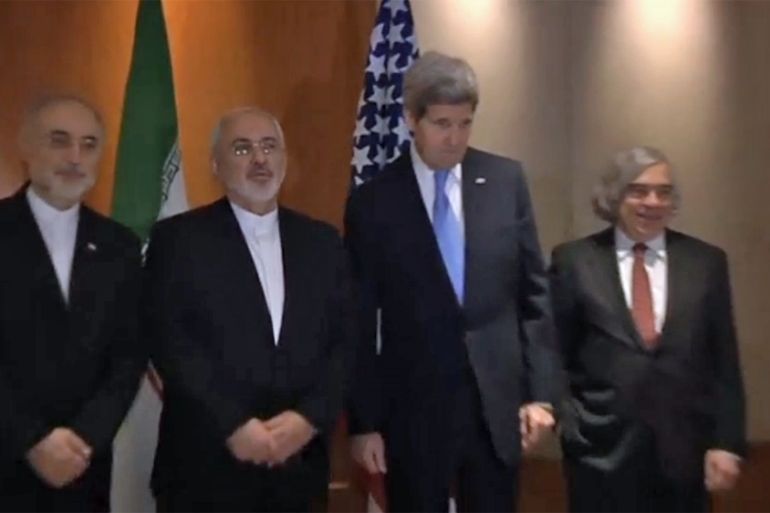US and Iran laud ‘progress’ in nuclear talks
There is still a “long road ahead” before a final deal is reached, Iran’s foreign minister told the press.

The United States and Iran have said that progress has been made in the latest round of talks on Tehran’s nuclear programme, but warned there was still a long way to go to seal a final deal.
Negotiators for Iran and six world powers had been meeting in Geneva since Friday and plan further talks in Switzerland next week, a senior US administration official said on Monday.
“These were serious, useful and constructive discussions,” the official told the AFP news agency after US Secretary of State John Kerry and Iranian Foreign Minister Mohammad Javad Zarif wrapped up two days of meetings in the lakeside city.
Zarif agreed. “Some progress was made on certain subjects, but there is still a long road ahead to reach a final agreement,” he told Iranian media.
As a March 31 deadline looms for reaching a political framework for a deal, State Department spokeswoman Jen Psaki told reporters in Washington that Kerry “could certainly participate at some point” in next week’s negotiations, but she had nothing concrete to announce.
“These talks have been productive, there’s still more work to do,” Psaki said.
The so-called P5+1 group of Britain, China, France, Russia, the United States and Germany are trying to strike an accord that would prevent Tehran from developing a nuclear bomb.
In return, the West would ease punishing sanctions imposed on Tehran over its nuclear programme, which Iran insists is purely civilian in nature.
|
|
The idea would be to reward Iran for good behaviour over the last years of any agreement, gradually lifting constraints on its uranium enrichment programme and slowly easing economic sanctions.
Iran said it does not want nuclear arms and needs enrichment only for energy, medical and scientific purposes, but the US fears Tehran could re-engineer the programme to produce a nuclear weapon.
10-year restrictions
The US initially sought restrictions lasting for up to 20 years; Iran had pushed for less than a decade. The prospective deal appears to be somewhere in the middle.
One variation being discussed would place at least a 10-year regime of strict controls on Iran’s uranium enrichment programme.
If Iran complies, the restrictions would be gradually lifted over the last five years of such an agreement.
Iran could also be allowed to operate significantly more centrifuges than the US administration first demanded, though at lower capacity than they currently run.
Several officials spoke of 6,500 centrifuges as a potential point of compromise, with the US trying to restrict them to Iran’s mainstay IR-1 model instead of more advanced machines.
It would also be forced to ship out most of the enriched uranium it produces, or change it to a form that is difficult to reconvert for weapons use.
It takes about 1 tonne of low-enriched uranium to process into a nuclear weapon, and officials said that Tehran could be restricted to an enriched stockpile of no more than 300 kilogrammes.